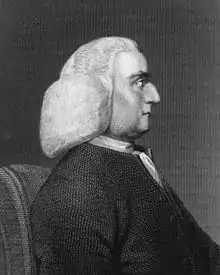Nathaniel Cotton
Nathaniel Cotton (/ˈkɒtən/; 1707 – 2 August 1788) was an English physician and poet.[1]

Cotton is thought to have studied at Leiden University, possibly under Herman Boerhaave.[2] Cotton specialised in the care of patients with mental health issues, maintaining an asylum known as the Collegium Insanorum, at St Albans. William Cowper was one of his patients[3] and held Cotton in high regard.[4]
Cotton was also a published poet, whose poems were described by Cheever as "full of good sense, benevolence, and piety"[4] although not works of genius. He was the author of Visions in Verse, first published in 1751; and a two volume complete collection of his works was published in 1791.[2]
He was married twice, first in 1738 to Anne Pembroke, with whom he had eight children, six of whom survived past infancy and one, Joseph Cotton, who became a director of the Honourable East India Company. His second marriage in 1750 or 51 was to Hannah Everett, with whom he had a son and two daughters. He died at St Albans on 2 August 1788 and is buried in St. Peter's churchyard.[1]
After Cotton's death the asylum was run by Dr Stephen Pellet.
References
- Johnson, Samuel; The Works of the English Poets, from Chaucer to Cowper, volume XVIII, 1819, pp. 4–5
- Gay's Fables and Other Poems: Cotton's Visions in Verse; Moore's Fables for the Female Sex, 1826
- Campbell, Thomas; Specimens of the British Poets: With Biographical and Critical Notices volume VII, 1819, p. 131
- Cheever, George B; Studies in Poetry, 1830, p. 121
External links
- Nathaniel Cotton at the Eighteenth-Century Poetry Archive (ECPA)
- Visions in Verse, in an 1826 anthology
- "Nathaniel Cotton 1705–1788". Halhed genealogy & family trees. Archived from the original on 7 October 2011. Retrieved 24 February 2011.